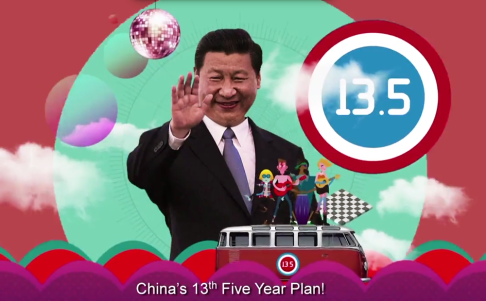“Hey, have you guys heard what’s going on in China? President Xi Jinping’s new style? Yes and there’s more …”
China’s propaganda machine is trying a new tack this week to publicise its economic and social plans by using an animated hipster pop music video – complete with a guitar-strummed song performed in American accents by four cartoon characters as they stand on top of a retro Volkswagen van.
The aim of the video, produced by a mainland animation studio that often works on state propaganda, is to tell English-speaking foreigners about the nation’s latest five-year social and economic plan that is being discussed behind closed doors by the Communist Party this week.
http://www.scmp.com/sites/default/files/styles/486w/public/2015/10/27/xijinping-xinhua.png?itok=ElVM
“Every five years in China, man. They make a new development plan. The time has come for number 13, shi-san-wu [13-5], that’s what it means! ...
“Wanna know what China’s gonna do? Best pay attention to the shi-san-wu!”
The video features one of the four cartoon characters with a lightning bolt across his face, just like singer David Bowie's Aladdin Sane persona, plus a cameo appearance by scientist Albert Einstein.
It was promoted by state media on Xinhua News’s Twitter on Tuesday, but can also be found on major video websites, too.







